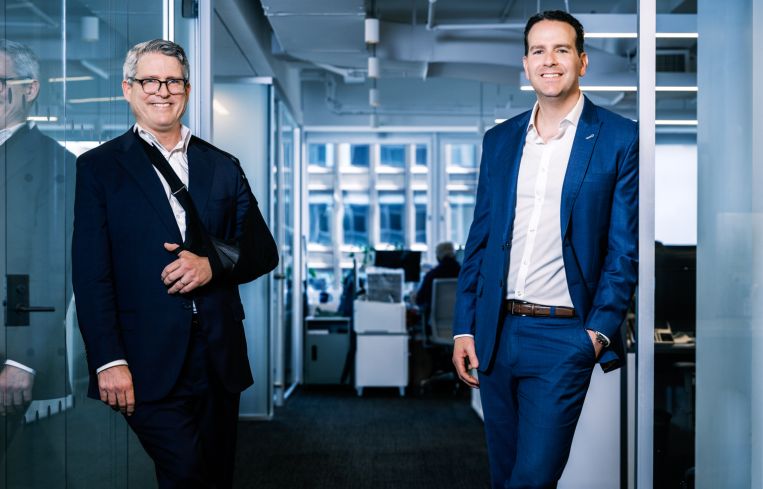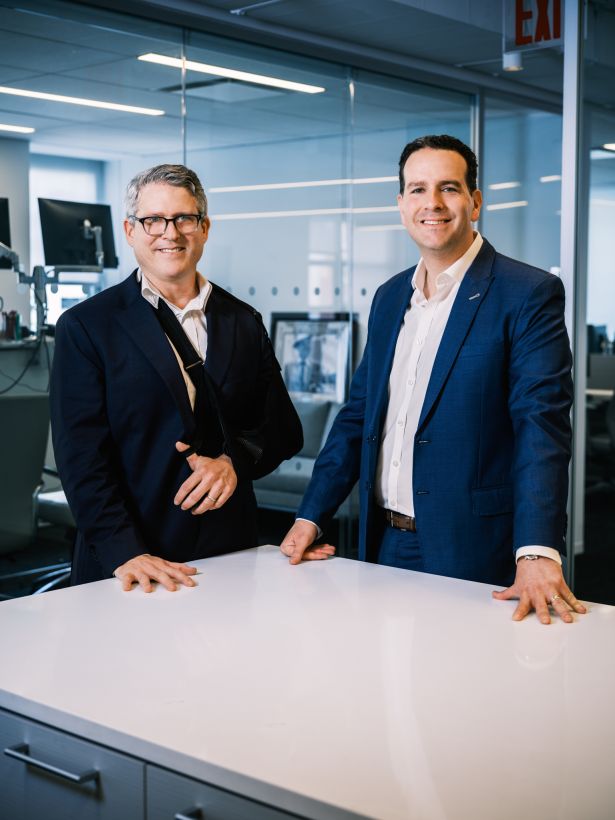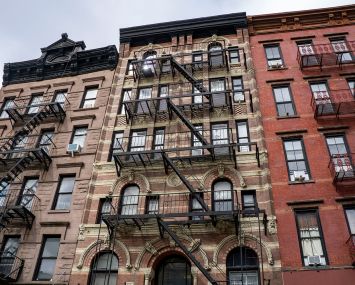Steven E. Baker and Lee Block On Taking a Repositioned RTL in New Directions
The executives lead the retail brokerage once known as Winick
By Alison Rogers May 21, 2025 6:00 am
reprints
Philosophy has long struggled with the question, “Is it possible to be both a realist and an optimist at the same time?” But that combination seems to be the secret sauce for RTL — an abbreviation of “retail” pronounced as its letters — a boutique real estate services company of 25 brokers that just rebranded. It was originally named after founder Jeff Winick, and focused mainly on retail.
Redefining the heritage brand into something wider are new CEO Steven E. Baker and new President Lee Block, both of whom sat down earlier this month with Commercial Observer in Midtown to talk about the company’s history and the next 40 years. The two, who have each been at the firm for around 20 years, have an easy, almost familial rapport. When a reporter asked about the name change, Block said to Baker, “Are we aligned on this?” and Baker responded “We’re aligned with whatever you’re saying.”
If optimists are derided for wearing rose-colored glasses, then the RTL spirit is rose-colored reading glasses. This is a firm that doesn’t skip the details and the analytics.
By the time you read this, Baker’s left shoulder will have been patched together in four places, to remedy the results of a recent hard fall. But, in the rough-and-tumble world of real estate, it’s not how you trip, but how you get up that matters — and the RTL team has plenty of charging forward to do. The executive duo, who refer to themselves as “player-coaches,” are preparing for a future as a bigger boutique, keeping their focus on service while growing their luxury business, as well as adding some entrepreneurial business (think: equity raises).
This interview has been edited for length and clarity.
Commercial Observer: You just rebranded. How did you think about that, and about charting your future?
Steven E. Baker: We saw a need for a boutique real estate services company that does multiple things well. There are global companies out there that do a number of things, but we wanted to be a smaller, boutique company that does multiple asset classes well: Retail leasing, which is our core business; investment sales; and a lot of new entrepreneurial things that we’re going to be accomplishing that we can’t really disclose right now.

How many brokers do you have?
Baker: Approximately 25.
Lee Block: It’s smaller than before the pandemic, but we are growing from that number…
Baker: … with a number of new hires on the way, whether it be interns or, we have this fantastic agent training program. We take four kids out of college twice a year, and we really train them in a very structured manner, which not many companies do. In addition to that, we don’t wait for résumés — we’re a pretty proactive company. We go to the colleges. We went to Miami, we went to Syracuse, we think it’s necessary to get the best and brightest talent to go out to them.
Block: It gives us a feel for their environment…
Baker: …being proactive is what our model is.
Sometimes when people say “proactive” they mean “the market’s slow.” How’s your market?
Block: Retail is unbelievably opportunistic, especially in New York, and there are always cycles. Coming out of a challenging time, there are plenty of opportunities that retailers are taking advantage of, in a good way. Prices were down out of the pandemic, and the challenging time didn’t keep retailers away.
The well-capitalized, best-in-class operators, the creditworthy tenants that had longevity, they made the most of it, expanded their footprints, reshuffled their portfolios, did the things they needed to do for the next 10-plus years.
Baker: Adding to Lee’s point — as a company, and as an individual, because we’re all player-coaches, predominantly our job is to still be brokers. Some of our best years in the company have come after those types of years: after 9/11, after the Lehman Brothers crisis [in 2008]. Clients in down times need brokers more than when the times are really terrific. When times are really down and bad, that’s when we, service providers, are needed.
How are tariffs affecting you?
Block: Volatility definitely causes people to take a step back and evaluate their future business decisions, and our business is no exception. Retailers have definitely felt the brunt of it across all categories, whether it’s food, or general merchandise, clothing, whatever. That said…
Baker: Let me interrupt. I’m an optimist at the end of the day, and this is my personal, subjective option, but I don’t think these tariffs are going to be long-term. … I think eventually the world will come back to us, and we’re going to be laughing about this. But, short-term, while they’re here, there’s obviously worry and concern.
Let’s go back to the idea of “player-coaches.” You are both working brokers. What percent of your time do you spend “brokeraging” and what percent do you spend managing?
Block: As player-coaches, we have a great team here that runs the company incredibly well and efficiently, and allows us to take care of all of our clients, and be as committed to the brokerage side as necessary.
Baker: Personally, I really enjoy the brokerage end of things. I like the management end of things, but brokerage is how we all started, brokerage is what brought us to the dance, and we’re primarily brokers. And, as we transition to the management end, it doesn’t mean that our clients aren’t getting the same or even better coverage than they used to have.
A weird hypothetical. If you had God-like powers, and you could create any building in New York, what would you create? Tell me about what’s missing from New York.
Baker: I would create not a building per se, but because office seems to be getting more into the hospitality business, I would marry the high-level hotel brands and brand office buildings. Like Four Seasons, or Rosewoods, or Amans, etc. If you think about the synergy between office and hospitality, why not co-brand? Four Seasons Office Tower. If I have the capacity to change one thing, I think that should be a trend.
Of course, now that this idea will come out publicly … I do have the trademark [shrugs] but, you see, that’s the kind of creative thinking we give to our clients.
Is there any brand or retail trend you’re planning on?
Block: A brand, or a trend?
A retail trend you’re planning on.
Block: I think where we want to go in terms of entrepreneurial is we want to start getting involved in equity raises for retail tenants, more so than we have in the past. In the past we’ve been a bunch of individual brokers who have maybe invested a little bit of their own personal capital into a retailer. But I think, as a company, we want to be a little bit more entrepreneurial.
Baker: We are retail brokers and we do see the best concepts, the hottest concepts before most people do. We want to identify them and get an equity raise.
There would be, like, an RTL fund?
Baker: RTL Fund LLC.
How did you get started? Why real estate?
Block: I grew up in Baltimore, I caddied at a golf course at a private country club, and met many heads of businesses, and was introduced to a gentleman who owned his own development company — shopping centers, leasing arm — and I didn’t even know what the business was. He brought me in, and I was enamored — that was during college — and I put aside my accounting degree and CPA aspirations — to the extent I aspired to be a CPA — to go work for him. And I learned the business for two years in Baltimore.
When the market crashed in `08 I said, “Well, this is a great time to move to New York.” I came here at the bottom of the down cycle, and joined a great team. I’ve been here 18 years since I started. I started as a trainee, and I became a partner, and here we are.
Baker: From college to the age of 29 I worked in a family-through-marriage company. I worked really, really hard, but there was a ceiling to what I was making, and simultaneously I had a few friends I knew who were retail brokers, and they were making more money than I was making in a family business where I was working extraordinarily long hours.
So, I was 29 years old at the time, and I was not married, I did not have kids. If I was going to take a risk in my life, that was the time to do so. And I came here in 2000, and realized it was an extraordinarily easy business and an extraordinarily hard business at the same time. One thing I can control is my work ethic, and I can work harder than most people, and I made more money in my first and second year than I had made in my entire previous career. [Baker steps out to take a call after a phone rings.]
Lee, what do you want to talk about?
Block: Retail momentum right now. I think about how we do things differently than other firms, what’s our competitive advantage, things like that. As Steven and I already said, we’re nimble, we’re boutique, all those nice buzzwords, but I think we do a really good job not just servicing our existing clients, but helping new businesses, helping companies and brands that aren’t in our market enter the market — and understand the pros and cons, the advantages, the things that they need to be successful here. And we’ve executed on that, and kept those relationships for many years, and we’ve done it successfully many times.
We just brought a company to SoHo for their first U.S. location. [They declined to name the company.] Last year we did first in the U.S. for another fashion brand from Europe, Galia Lahav. We did it with another large-scale retailer — their first location in New York — Golftec. These aren’t easy deals for people to comprehend when rents are exponentially higher than any other market that they’ve previously operated in.
I think our knowledge of the market, the information that we can provide, and, almost more importantly, the relationships that we have, the decades of relationships, become an advantage for the clients. [Baker re-enters] … So that’s why I should be CEO and president.
Baker: [Laughs] You want it, you got it.
Where do you want to be in five years?
Baker: We want to be the brand that institutional clients, biggest families, bigger clients in our business look to as their top choice as a real estate services provider.
Block: In a place with a culture that people want to work at.
Baker: Can I just add something with what I’m dealing with right now, what I mean by “services provider”? I have a shoulder surgery scheduled for tomorrow morning and I need to send reports to the doctor to be cleared for surgery. I called the hospital, they said, “We’re going to send it.” They don’t send it. Now, I have a time deadline: I have one hour to get that report, or my whole surgery is going to be canceled. That’s a lack of service providing. We want, here at RTL, to be on top of everything. You say you’re going to do something, meet expectations. Overdeliver. Or just … deliver.
Let’s go to the point of work ethic/culture/service business. I don’t think anybody who’s a broker says, “Today I’m gonna fart around and make money.” I think everybody wakes up and says, “Today I’m gonna work as hard as I can, and I’m going to make money.” But how do you keep the energy flowing once you’ve had some success?
Baker: As an individual, you have to be wired a certain way. If you are not wired a certain way, it’s going to be very hard to be successful, much less while having a very challenging job in the most competitive market in the universe. You have to have a burning desire to be successful, and that burning desire needs to translate into your work ethic. Sans having an extraordinary Rolodex — which is an outlier — you’re going to have to really work hard.
In this business in particular, it’s a business where you’re an independent contractor, so theoretically it doesn’t matter if you’re in the office or not. But you can judge people on, “Are they here early? Are they here late? Do they work hard?”
One of my bigger deals I got because I was just one of the few people in the office at 7 in the morning. And the principals of the company were some of the hardest workers. At the end of the day, if one of the components of your success is just work hard, and you control that, to me, that’s the easiest thing in the world. Outwork your competitor, be in the gym earlier, get done what you need to get done.
Your push into luxury: Sometimes clients get richer, they move up to a higher product, and then they no longer need the service provider who got them there. They want the broker they see on TV. Do you need to do anything different for luxury? And how do you see the luxury market?
Block: There’s a lot of momentum in the luxury market, especially in New York. We see a lot of activity, whether it’s new-to-market brands, or existing luxury heritage brands expanding or repositioning, and … it’s about relationships and nurturing your relationships, whether it’s on the landlord side or the tenant side.
Baker: Traditionally in the past, our firm, while we have been extraordinarily successful, we haven’t been known as the luxury brand, but we can play on any field the global competition can play on. We have a lot of institutional clients that are in luxury neighborhoods, and we intend to pick up the pace going after both luxury retailers and luxury assets.
The next hot market?
Baker: I focus a lot of my attention under the radar in Long Island City, Queens. About 15 to 20 years ago, we were hired by TF Cornerstone to rent their retail property. At first, I didn’t pay much attention to it, but after a little bit of time, I realized that the demand was far greater than the supply, and the retail rented fairly quickly. Our thesis at that time was that there aren’t too many New York City retail brokerage companies that focused on the Long Island City market.
We’ve rented One Court Square, which is over 100,000 square feet, to Target and Northwell.
And we just finished a terrific project in late March at 8 Court Square — rented to Warby Parker and Wells Fargo, among others. 18,000 square feet. We’re very excited about that one.
The hot market doesn’t have to be Manhattan, per se. I would say Gowanus, Brooklyn, is going to be another hot market.
Why?
Baker: Just look at the cranes.



